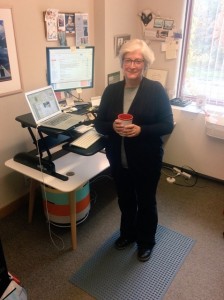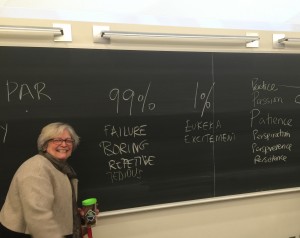UPDATE: This is my 15 January 2016 post, which is finally going live on 7 February 2016.
This Winter Term has been much more hectic that Fall Term 2015, because I'm teaching 2 four-credit biology courses: BIOL 2010.40 (Plant Biology) and BIOL 3290.40 (Plant Ecology). Each course has 3 lecture hours a week, and between 1 to 6x3 hour labs, meaning that I'm working with 2 technicians, 1 lab co-ordinator and 6 Teaching Assistants, while teaching about 160 undergraduates.
 I've been working up to this since August 2015. So far, my back is holding up, though spending all day on my feet is quite tiring. My longest working week this term was Saturday 23rd - Friday 29th January: I put in a mind-numbing 68 hours over the course of teaching, attending & speaking at a conference about Arctic Sovereignty and Security, where the Hon. Carolyn Bennett the Federal Minister of Minister Indigenous & Northern Affairs spoke, and giving a Sunday morning talk to the High Park Stewards group: yes, I track my hours.
I've been working up to this since August 2015. So far, my back is holding up, though spending all day on my feet is quite tiring. My longest working week this term was Saturday 23rd - Friday 29th January: I put in a mind-numbing 68 hours over the course of teaching, attending & speaking at a conference about Arctic Sovereignty and Security, where the Hon. Carolyn Bennett the Federal Minister of Minister Indigenous & Northern Affairs spoke, and giving a Sunday morning talk to the High Park Stewards group: yes, I track my hours.
I don't plan doing another such week any time soon. My back won't let me. Here's my delayed post about the Academic Work Week:

Prof. Marc Spooner organized the University of Regina, Public Engagement and the Politics of Evidence Conference
I had seen references to the recommended working week for UK professors being 36 hours in various Times Higher Education Magazine articles. At the July 2015 Public Engagement and the Politics of Evidence conference (#pepe2015) at the University of Regina, Saskatchewan, Dr. Rosalind Gill spoke on "The quantified self of neoliberal academia". In her talk she covered the topic of filling out weekly time-sheets for academics, and just how much time away from publishing is lost due to parenthood.
The time sheet business was a new one to me, but not the topic of how long the negative impact of motherhood on one's publishing record persists. I've thought about this for 21 years (the age of my eldest daughter).
Apparently, in the UK REF (Research Excellence Framework) exercise, one baby equals one publication or journal article. Klocker & Drozdzewski (2012) in the journal, Environment and Planning A. 44:1271-1277, discussed this topic at length.
@david_colquhoun Yikes! @AMCELL Many here at #PEPE2015 likely hearing about UK #REF for 1st time. @RosalindGillLdn: #1BabyEquals1Publication
— Dawn Bazely (@dawnbazely) July 24, 2015
My experience is that my publishing output dropped over several years after my daughters were born.
Hmmmm....academic existential 'joke'...Two feminists walk into a room and ask how many papers a baby is worth? #pepe2015 @RosalindGillLdn
— Natasha Hub-doch (@NatashaLHM) July 24, 2015
Both this discussion and the time-tracking and recommended maximum working week of 37 hours seemed kind of crazy to me, because everyone in academia, especially STEM (but not only us nutty scientists) knows that if you work only 37 hours a week as a grad student and post-doc, that you'll likely never get an academic job.
Furthermore, I can definitely state that in the STEM subjects, such a work week is highly unlikely to advance one from an Assistant Professor to Associate Professor, and from an Associate Professor to Full Professor. In fact, one THE article stated that 40 years of surveys of UK academics indicate that most work 50 hour work weeks.
Am I being able-ist here? I would argue no. I'm very accustomed to making all kinds of accommodations for my students and colleagues facing mental health and physical health challenges and barriers. Some of these situations are episodic but others are chronic. In my view supports and allowances for this are essential. I'm the beneficiary of such policies: in 2015, York University bought me a standing desk so that I could get work done.
Nevertheless, at the end of the day, academic work -- teaching, research, and service -- takes a lot of time. It is most definitely not a 9 to 5 job.
I absolutely DO NOT buy into the rhetoric of the 70-80 hour academic work week that Prof. Meghan Duffy recently so eloquently dismissed. In fact, other than one science prof. colleague, I've never heard anyone say that. Though, one colleague told me in a meeting with 3 other male professors, when my kids were young, that my husband should get a job in a donut shop, so that I could be in my lab on the weekends. What was most telling about that, was not that he said it, but that none of the other 3 profs. said anything to him about his misogyny, after he said it. That happened in around 2000.
So, can we do our work in an average 37 hour work week?
My recent experience with a 20-35 hour work week
It's nearly 9 months since my back injury. Over the summer, with rehab and recovery, I managed to work 20 to 35 hours per week. Consequently, the 2 books and major papers that I was supposed to get done simply never materialized. I also never made it to 2 (paid for) conferences. I cancelled an entire field season of experiments.
Cue to September 2015, when I finally found a daily lift to work, because I still couldn't drive my car, and the bone-shaking aspects of the TTC buses had made that a non-starter. With the daily lift to the lab, I was able to work 8-9 hour days at my standing desk: this gave me a 40-45 hour week. I slowly started to catch up on missed tasks. I took my breaks doing back exercises on my office pilates mat.
Since January 2016, I have been working 50-55 hour weeks with my new found super-power of standing all day, and sitting for a max of 3 hours (car and meetings). This is a normal work week for many profs. But I'm still months away from picking up all of those dropped threads (apologies to all the editors and colleagues whom I've not gotten back to).
This is NOT the 70-80 hour week madness that Meghan wrote about. But, it IS far above the 37 hour recommended work week.

@dawnbazely week2 Plant Biology explains the true nature of science as a process (picture by Rolan Vaisman)
Recommended by whom, I wonder? Not actual academics, it seems. Yes, I'm well aware of the drop in productivity post-40 hours, but, the grunt work simply takes time that cannot be avoided.
Long-term experience with a 40-45 hour work week, as a mum of 2 kids
My career as a parent of 2, directly reflects the career costs that a shorter work week has on a woman in STEM. When children are young, daycare hours constrain the work week. In my case, they limited it to Monday to Friday, for just over 7 years, until my youngest daughter started to Grade 1 at 6 years of age.
Boath times I was pregnant, no one at York University or NSERC explained the rules about maternity leave accommodations including extensions to grants, and reduced teaching loads. It was left entirely up to me to read the fine print. I later received retro-active teaching credit for the full course load that I returned from my maternity leave to teach, when my kids were 5 months old. I have written about how I seriously considered resigning from my job as a tenured prof., and about how I got a career coach in a 2005 University Affairs feature article.
 My maternity leave was 16 weeks and at 17 weeks, my daughters crawled off to the infant room in non-profit licensed daycares that operated from 7am to 6pm. This forced me and my husband into working a regular work week, of 8:30am-5pm. I was committed to things like breastfeeding beyond 6 months, so I pumped milk in my office. Many university campuses still lack adequate breast-feeding and pumping facilities today, and I'm sorry that campaigns such as Trent University's Breastfeeding Friendly Campus Initiative are needed 20 years later.
My maternity leave was 16 weeks and at 17 weeks, my daughters crawled off to the infant room in non-profit licensed daycares that operated from 7am to 6pm. This forced me and my husband into working a regular work week, of 8:30am-5pm. I was committed to things like breastfeeding beyond 6 months, so I pumped milk in my office. Many university campuses still lack adequate breast-feeding and pumping facilities today, and I'm sorry that campaigns such as Trent University's Breastfeeding Friendly Campus Initiative are needed 20 years later.
The long-term impact of kids included having to substitute distant field work locations for local field sites. This was in large part due to my husband, who is not an academic, having zero work flexibility. Plus, he was, himself, doing massive numbers of field trips, first as a federal government biologist, and afterwards, while working for an environmental charity. All of this took its toll on my research funding and publications.
My calculation of how many publications a baby is worth (I am n=1 data point)
The motherhood penalty and the fatherhood bonus are well-documented. I've experienced them. Neighbours would invite my husband and children over to dinner when I was doing fieldwork in SW Ontario, but I never received similar invitations when he was away in the field. OK, maybe my company, as a sleep-deprived, stressed-out prof., sucked, but neighbours could at least have dropped off food for me.
The lifetime pattern in the working hours of a female academic who manages to get tenure and stay in the system means that once your youngest hits Grade 1, it IS possible to ramp your work week back up to 50 to 55 hours per week. I began all kinds of cool new research when this happened, including a return to arctic research.
Thanks to the kind of field work that I did, but didn't publish, from 1995-2002, I'm optimistic that the data for the 14 journal articles that I never submitted or revised and re-submitted, WILL see the light of day. For, me, one baby was the equivalent of 7 peer-reviewed primary journal papers.
One thing, though, is that I'm still very curious about the data showing how an academic who devotes 37 hours a week to teaching, research, and service can survive and thrive.

